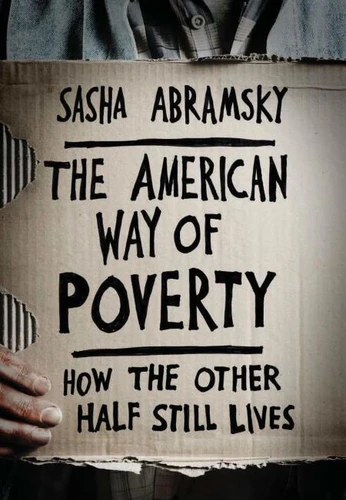The American Way of Poverty. How the Other Half Still Lives
Par :Formats :
Disponible dans votre compte client Decitre ou Furet du Nord dès validation de votre commande. Le format ePub protégé est :
- Compatible avec une lecture sur My Vivlio (smartphone, tablette, ordinateur)
- Compatible avec une lecture sur liseuses Vivlio
- Pour les liseuses autres que Vivlio, vous devez utiliser le logiciel Adobe Digital Edition. Non compatible avec la lecture sur les liseuses Kindle, Remarkable et Sony
- Non compatible avec un achat hors France métropolitaine
 , qui est-ce ?
, qui est-ce ?Notre partenaire de plateforme de lecture numérique où vous retrouverez l'ensemble de vos ebooks gratuitement
Pour en savoir plus sur nos ebooks, consultez notre aide en ligne ici
- Nombre de pages368
- FormatePub
- ISBN978-1-56858-955-8
- EAN9781568589558
- Date de parution09/09/2013
- Protection num.Adobe DRM
- Infos supplémentairesepub
- ÉditeurBold Type Books
Résumé
Selected as A Notable Book of the Year by The New York Times Book Review Fifty years after Michael Harrington published his groundbreaking book The Other America, in which he chronicled the lives of people excluded from the Age of Affluence, poverty in America is back with a vengeance. It is made up of both the long-term chronically poor and new working poor -- the tens of millions of victims of a broken economy and an ever more dysfunctional political system.
In many ways, for the majority of Americans, financial insecurity has become the new norm. The American Way of Poverty shines a light on this travesty. Sasha Abramsky brings the effects of economic inequality out of the shadows and, ultimately, suggests ways for moving toward a fairer and more equitable social contract. Exploring everything from housing policy to wage protections and affordable higher education, Abramsky lays out a panoramic blueprint for a reinvigorated political process that, in turn, will pave the way for a renewed War on Poverty.
It is, Harrington believed, a moral outrage that in a country as wealthy as America, so many people could be so poor. Written in the wake of the 2008 financial collapse, in an era of grotesque economic extremes, The American Way of Poverty brings that same powerful indignation to the topic.
In many ways, for the majority of Americans, financial insecurity has become the new norm. The American Way of Poverty shines a light on this travesty. Sasha Abramsky brings the effects of economic inequality out of the shadows and, ultimately, suggests ways for moving toward a fairer and more equitable social contract. Exploring everything from housing policy to wage protections and affordable higher education, Abramsky lays out a panoramic blueprint for a reinvigorated political process that, in turn, will pave the way for a renewed War on Poverty.
It is, Harrington believed, a moral outrage that in a country as wealthy as America, so many people could be so poor. Written in the wake of the 2008 financial collapse, in an era of grotesque economic extremes, The American Way of Poverty brings that same powerful indignation to the topic.
Selected as A Notable Book of the Year by The New York Times Book Review Fifty years after Michael Harrington published his groundbreaking book The Other America, in which he chronicled the lives of people excluded from the Age of Affluence, poverty in America is back with a vengeance. It is made up of both the long-term chronically poor and new working poor -- the tens of millions of victims of a broken economy and an ever more dysfunctional political system.
In many ways, for the majority of Americans, financial insecurity has become the new norm. The American Way of Poverty shines a light on this travesty. Sasha Abramsky brings the effects of economic inequality out of the shadows and, ultimately, suggests ways for moving toward a fairer and more equitable social contract. Exploring everything from housing policy to wage protections and affordable higher education, Abramsky lays out a panoramic blueprint for a reinvigorated political process that, in turn, will pave the way for a renewed War on Poverty.
It is, Harrington believed, a moral outrage that in a country as wealthy as America, so many people could be so poor. Written in the wake of the 2008 financial collapse, in an era of grotesque economic extremes, The American Way of Poverty brings that same powerful indignation to the topic.
In many ways, for the majority of Americans, financial insecurity has become the new norm. The American Way of Poverty shines a light on this travesty. Sasha Abramsky brings the effects of economic inequality out of the shadows and, ultimately, suggests ways for moving toward a fairer and more equitable social contract. Exploring everything from housing policy to wage protections and affordable higher education, Abramsky lays out a panoramic blueprint for a reinvigorated political process that, in turn, will pave the way for a renewed War on Poverty.
It is, Harrington believed, a moral outrage that in a country as wealthy as America, so many people could be so poor. Written in the wake of the 2008 financial collapse, in an era of grotesque economic extremes, The American Way of Poverty brings that same powerful indignation to the topic.







